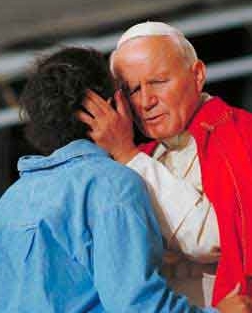Celebrating and receiving the Sacrament of Reconciliation can be among the most blessed of human experiences. Yet, there are a number of reasons why we don't take advantage of this Sacrament or we don't celebrate it well. Fear, shame, bad experiences of the past, a long time since the last reception of the Sacrament or bad habits in celebrating it now are all possible reasons for struggles with this Sacrament. The solution is so simple. A simple understanding of the Sacrament and a small encouragement to give it a new try, with a new expectation, can literally change our lives and will certainly renew our faith.
 The Sacrament of Reconciliation is God's gift to us. In the story of the Prodigal Son, Jesus tries to tell us that God is simply waiting for us to "come home." In the story, the father is not only waiting, he is out by the road longing for the wayward son to return. And when the son begins to give his practiced speech of repentance, the father interrupts him and shouts orders to begin the celebration. Jesus is telling us that this is how God feels about our reconciliation. It isn't about our having to shame ourselves or face being scolded. It is all about letting ourselves receive the merciful and healing love and peace that only God's love can give us.
The Sacrament of Reconciliation is God's gift to us. In the story of the Prodigal Son, Jesus tries to tell us that God is simply waiting for us to "come home." In the story, the father is not only waiting, he is out by the road longing for the wayward son to return. And when the son begins to give his practiced speech of repentance, the father interrupts him and shouts orders to begin the celebration. Jesus is telling us that this is how God feels about our reconciliation. It isn't about our having to shame ourselves or face being scolded. It is all about letting ourselves receive the merciful and healing love and peace that only God's love can give us.
What does serious sin look like? How do I examine my conscience?
First of all, let's consider what serious sin is. According to the teaching that many of us learned in our catechisms or religious education, there are serious sins and less serious sins. A serious sin is call a "mortal" sin because it mortally wounds our relationship with God. To say it another way, when we see what a mortal sin is, it will become clear to us that it is a choice which involves turning my back on my relationship with God, freely and deliberately. Less serious sins, called "venial sins," involve weakness and patterns of sin in our lives. They are sins, for sure, and involve "missing the mark" of what it means to be a follower of Jesus, but, as we will see clearly, they don't involve a free and deliberate choice to turn our backs completely on our relationship with God.
For something to be a mortal sin, three things are required. All three of them are necessary. It must be something quite seriously wrong. It must be something I do, knowing its seriousness and knowing that it is wrong. And, it must be something I do deliberately, that is, freely. So, for something to be a mortal sin, I have to understand that something is serious enough to ruin my relationship with God and freely choose to do it anyway.
When we examine our consciences, we are looking primarily for things like that. And,we are looking for them in two areas: in what I've done and in what I've failed to do. For example, I might never have abused my children, verbally or physically, but I might examine my conscience and recognize that I failed in my responsibility to raise them in the faith - the commitment I made at the time of my marriage and at their baptisms. However, I might judge that, though it is a serious matter, I didn't do it deliberately and intentionally. In that case, I might examine this situation in terms of my overall selfishness or failure to live my commitments - perhaps venial sins in the area of what I've failed to do, but for which I can ask for forgiveness and healing so I can do this better in the future, or receive our Lord's peace, even if I can't fix the past.
Our Sins Are Forgiven
 We must never forget what happens in the Sacrament of Reconciliation. Our sins are forgiven! They are taken away. The slate is wiped clean. We have a new beginning - a fresh start. We receive God's mercy and are filled with God's peace. And, once this total and complete forgiveness happens, deep and lasting healing can happen as well.
We must never forget what happens in the Sacrament of Reconciliation. Our sins are forgiven! They are taken away. The slate is wiped clean. We have a new beginning - a fresh start. We receive God's mercy and are filled with God's peace. And, once this total and complete forgiveness happens, deep and lasting healing can happen as well.
So, it's a great idea to return to the Sacrament of Reconciliation and to receive a fresh start and to let the grace of healing begin. Most of us are ready to do that because we really miss communion with our God. We really don't like division, conflict, selfishness, negativity, disorder, injustice or dishonesty. We long for integrity and a love which nothing but this Sacrament can offer us.
Considering Four Sets of Circumstances
Every single one of us is completely unique. All our situations bear the unique circumstances that make up our lives. These four hypothetical examples considered here are made up to allow us to understand four types of situations which might prevent us from coming to the Sacrament of Reconciliation. They don't represent any real persons or actual situations, but all of us will recognize why circumstances like these might keep us from celebrating the Sacrament. These examples will then help us consider how to choose to act on the invitation to come back to the Sacrament, if our situation is even remotely similar to these made up circumstances.
# 1: "It's been a long time and a long list of big sins are frightening me."
"I suppose my last confession was 20 or 30 years ago - the last time I had to go with my parents, when I was in high school. I haven't gone mostly because I'm ashamed of my past. And, when I get right down to it, I'm really embarrassed to tell a priest I've been going to Communion all those years. I figured people would see through me and see what a major sinner I am, if I didn't go to Communion. I know I shouldn't have done that, but I did. I was promiscuous in high school and college. I experimented with drugs and risked the lives of others while driving drunk or stoned many times. I lied and created all kinds of fictions to cover-up my activities. The worst thing I've done is when I was a sophomore in college, I got pregnant. [or, if the person is male: the girl I was going with got pregnant] I was so terrified that I panicked and had an abortion. [or, if the person is a male: I was so terrified, and so was she, so I paid for her to have an abortion]. When I was engaged, before I got married, my spouse and I slept together the whole time and we eventually moved in together to save money. All during that time, and after we were married, we practiced birth control. I can't even tell you the number of times I've lied. I'm ashamed that I stole something at work. It was stupid, but I did. I've cheated a little on filling out my taxes for years, but I figured that everybody else does, too. I have impure thoughts and I sometimes masturbate. And, I have all the flaws other people do: I'm impatient and judgmental. Of course, we sometimes missed Mass on Sunday and Holy Days and I didn't confess those. So, you can see why it is hard for me to go to Confession and actually tell all this to a priest."
Our Lord's message to anyone remotely carrying baggage like this imaginary person is a message full of great news. First of all, this is what the Sacrament of Reconciliation is all about. It is an invitation to give ourselves a chance to experience the incredible freedom of forgiveness and a new beginning. No one is going to judge us. We won't get interrogated. We'll experience God's mercy, as we never imagined. We don't need to hold on to all this stuff any more. And, once this is all out of the way, and we are no longer holding on to the guilt of it all, we can begin again to live the adult life of a follower of our Lord. So much healing will follow the forgiveness.
# 2: "It's been a long time, but I don't think I do that much wrong."
"I suppose my last confession was eight or ten years ago. I sort of got out of the habit. I used to confess the same small sins over and over and I just said, 'What's the use?' I don't commit big sins. I go to Mass every Sunday. I know I'm not perfect. The people I live with and work with would be the first to tell you that. I think I try to do good for my neighbor. I just got away from going to Confession. I just tell the Lord I'm sorry and that's that."
The message our Lord has for this set of circumstances is an encouragement to enjoy the benefits of the Sacrament of Reconciliation more frequently, as a means to grow in our Lord's grace and his peace. More frequent confession will often lead to a better examination of conscience. It may be the case that we won't have any serious sins to confess - even when we consider what we have failed to do. However, examining how we have fallen short in a variety of areas will usually result in our discovering places we need forgiveness and healing. We can ask for God's grace to shine in our hearts and to free us to love more generously and selflessly. The results are often wonderful: we have a personal experience of renewal that begins a new relationship with our Lord and a daily pattern of prayer with him.

# 3: "I go frequently, but I confess the same serious things over and over again."
"I celebrate the Sacrament at least once a month, and sometimes weekly. It's a bit embarrassing because I keep confessing the same pattern over and over again. [Anger and fighting with a spouse or particular person; an ongoing affair; a pattern of pornography use with masturbation; etc.]
I know that I intend to have a 'firm purpose of amendment,' but I can't seem to change and I keep coming to Confession because I want to keep going to Communion, but I wonder if I should."-
It is so important to keep coming to the Sacrament. We need God's grace and mercy. Without it, our efforts to stay close to the Lord are even more handicapped. The issue for us is to change our patterns. Some of our patterns might be deeply embedded habits and may require a genuine commitment and the help of others. Others may have become addictions which require therapy or a 12 step program. What starts to change our hearts is to focus on leaving the celebration of the Sacrament with deeper and deeper gratitude. The more we thank our Lord for his love and mercy is easier it is to resist temptation. Secondly, it is very important to put a pattern of prayer in place in our lives so that, throughout the day, we are saying "Loving, Father, my life is in your hands," or "Thank you for your grace today, Lord," or "I trust you will be with me in this challenging situation I face this afternoon." These kinds of "amendments" to our lives will make our celebration of Sacrament lead to effective healing.
# 4: "I go frequently, but I confess the same venial sins over and over again."
"I celebrate the Sacrament at least once a month, and sometimes weekly, but I often begin by telling Father that I have no mortal sins to confess. It is usually just confessing my impatience and my tendency to judge others. I often confess my pride and my envy of others who have more than I do. And more and more I've been just confessing I can't concentrate on my prayer or when I'm at Mass. I don't know if going to Confession is helping me any more."
The enemy of our human nature, the Evil Spirit, would love to have us just quit trying and would love even more to separate us from the Sacrament of God's mercy and peace. We can first of all make sure that we are examining our conscience on what we might have failed to do. Have we been as charitable and generous as we could have been? Have we fed the hungry, clothed the naked, visited the sick or imprisoned, in whatever ways we've heard our Lord's call to do those things? Have we exercised our civic responsibility and formed our consciences to hear the cry of the poor and follow the teachings of the Church regarding our role in the world and civil society? There are many ways we can come to a renewed sense of repentance, after years of confessing only the same things. After making sure we have not missed some serious sin in our examination, we can celebrate the Sacrament by being deeply grateful that our Lord has kept us from serious sin. We can then ask his grace to help us with the deep patterns, like impatience or judging others, for example. Offering us the grace of healing can be such a help to our being a witness to holiness and to our service of others.
Preparing, planning and celebrating
The greatest fruit in the Sacrament of Reconciliation will come if we take the time to prepare well. It takes real prayer and grace to come to this Sacrament well. It takes planning to say what we want to say well. This is all part of the time of grace that allows God to work in us and prepare us for a grace filled encounter. Finally, it is so important to come to the Sacrament as a celebration. This is an occasion for great joy and deep peace. It is a time of sincere expectation of grace to be given to us. Whatever Penance the priest offers us - "as a remedy for the healing desired" - we can all come forth from the Sacrament, giving thanks and praise for this experience of power of the Incarnation, Life, Death and Resurrection of Jesus touching my heart this day. This was all for me and it was for this moment. When we say "Amen" to this grace and open our hands and hearts to then receive the Eucharist and say "Amen" again, we experience the full meaning of the Communion with Jesus given to us in these two Sacraments together.